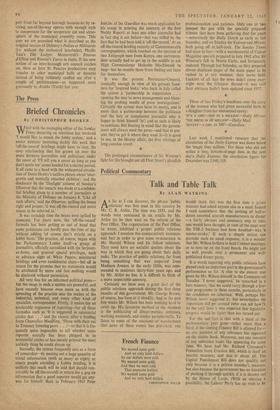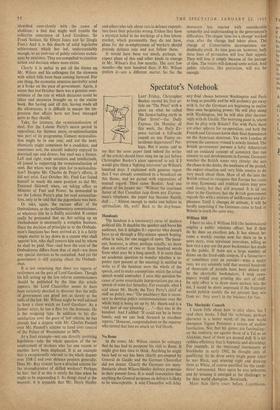Political Commentary
Talk and Table Talk
By ALAN WATKINS
A s far as I can discover, the phrase 'public ,,,,relations' was first used in this country by Mr. C. R. Attlee. The time was 1931, and the words were contained in an article by Mr. Attlee (as he then was) on the reform of the Post Office. The organisation of the Post Office, he wrote, inhibited a proper public relations approach. I mention this comparatively unimpor- tant fact in order to give sonic re-assurance to Mr. Harold Wilson and his fellow ministers. They need have no socialist qualms about the way in which they are going about their daily tasks. The practice of public relations, far from being something that was imported from Madison Avenue in the early 1950s, was com- mended to ministers thirty-four years ago, and by Mr. Attlee no less. It is difficult to think of a more respectable ancestry.
Certainly we have seen a great deal of the public relations approach during the first three months of this government. Mr. George Brown, of course, has been at it steadily. And in the past few weeks Mr. Wilson has been working hard to catch up. His favourite method at the moment is the publicising of dinner-parties, seminars, working weekends, and similar paraphernalia. To listen to some of the reactions of wonderment that news of these events has provoked, one would think this was the first time a prime minister had asked anyone else to a meal. Indeed I read somewhere that the inviting of half-a- dozen assorted aircraft manufacturers to dinner —a fairly obvious and necessary step to take, one would have thought, in view of the inept way the TSR-2 business had been handled—was 'a master-stroke.' If such a simple action can provoke such an awed response, it is a wonder that Mr. Wilson bothers to hold Cabinet meetings, or to turn up on the front bench. He might just as well preside over a permanent and well- publicised dinner party.
It is worth inquiring why public relations have played such an important part in the government's performance so far. A clue to the answer was given by Mr. Wilson himself in the Commons on Tuesday. 'I never suggested,' he remarked in a hurt manner, 'that we could carry through a live- year programme in three months, particularly in the conditions we inherited.' Well, perhaps Mr. Wilson never suggested it : but nevertheless the impression did get around (who can tell how?). At the very least it was expected that legislative progress would be faster than has turned out.
For the sad fact is that with a third of the parliamentary year gone—rather more than a third, if the coming Finance Bill is allowed for— no one measure of any substance has appeared on the statute book. Moreover, not one measure of any substance looks like appearing for some time. We have had Mr. Richard Crossman's Protection from Eviction Bill, which is itself an interim measure; and that is about all. The Capital Punishment Bill does not qualify, not only because it is a private member's measure, but also because the government has no intention of pushing it through quickly if it is thrown out by the House of Lords. (With an election a possibility, the Labour Party has no wish to be
identified over-closely with the cause of abolition : a fact that might well trouble the collective conscience of Lord Gardiner, Sir Frank Soskice, Sir Elwyn Jones and Sir Dingle Foot.) And it is this dearth of solid legislative achievement which has led, understandably enough, to an over-use of public relations techni- ques by ministers. They are compelled to simulate action and decision where none exists.
Clearly it is unfair to put all the blame on Mr. Wilson and his colleagues for the slowness with which bills have been coming forward. For one thing, the economic situation inevitably acted as a brake on the pace of government. Again, it seems that last October there was a genuine over- estimate of the rate at which decisions could be taken and measures brought on to the statute book. But having said all this, having made all the allowances, it is difficult to escape the im- pression that affairs have not been managed quite as they should.
Take, for instance, the re-nationalisation of steel. For the Labour Party's entire period in opposition, for thirteen years, re-nationalisation was part of its programme. Cement nationalisa- tion might be in one year, and out the next; chemicals might sometimes be a candidate, and sometimes not; the aircraft industry enjoyed its doctrinal ups and downs; but steel was a fixture. Left and right, trade unionists and intellectuals, all joined in supporting the re-nationalisation of steel. But where was the plan for re-nationalisa- tion? Despite Mr. Charles de Peyer's efforts, it did not exist. Last October Mr. Fred Lee found himself in much the same position as did Mr. Emanuel Shinwell when, on taking office as Minister of Fuel and Power, he demanded to see the Labour Party's plan for coal nationalisa- tion, only to be told that the pigeonhole was bare.
Or take, again, the curious affair of the Ombudsman, or the parliamentary commissioner, or whatever title he is finally accorded. It cannot really be pretended that an Act setting up an Ombudsman is necessarily a complex business. Once the decision of principle as to the Ombuds- man's functions has been arrived at, it is a fairly simple matter to lay down in a statute who shall appoint him, who shall remove him and by whom he shall be paid. Nor—and here the case of the Ombudsman differs from that of steel—are there any special interests to be consulted. And yet the government is still arguing about the Ombuds- man.
It is not surprising that there arc reports of restiveness on the part of Lord Gardiner. Though his bill setting up the law reform commissioners should be published by the time this article appears, the Lord Chancellor seems to have been curiously shocked to discover that the mills of government can grind just as slowly as the mills of the law. Mr. Wilson might be well advised to keep a close watch on Lord Gardiner. As a former actor, he has a flair for the dramatic. He is the resigning type. In addition to his dis- satisfaction over the pace of law reform, he has already had a dispute with Mr. Charles Pannell over Mr. Pannell's scheme to hand over control of the Palace of Westminster to MPs.
As a final example—not one directly involving legislation—take the whole question of the re- employment of workers who for one reason or another have been displaced. It is an example that is exceptionally relevant to the whole dispute over TSR-2 and over defence projects generally. Does Mr. Ray Gunter have a detailed scheme for the re-employment of skilled workers? Perhaps he has: but if so this is surely the time when he ought to be expounding it. As things stand at the moment, it is arguable that Mr. Denis Healey and others who talk about cuts in defence expendi- ture have their priorities wrong. Unless they have a mystical belief in the workings of a free labour market, which presumably they do not have, plans for the re-employment of workers should precede defence cuts and not follow them, It would have been too much, perhaps. to expect plans of this and other kinds to emerge in Mr. Wilson's first few months. The next few months—the next hundred days, if Mr. Wilson prefers it—are a different matter. So far the electorate has reacted with considerable sympathy and understanding to the government's difficulties. The slogan 'time for a change' worked even after the change had taken place. The charge of Conservative incompetence un- doubtedly stuck. As time goes on. however, both these lines of persuasion will lose their appeal. They will lose it simply because of the passage of time. The voters will demand sonic action. And public relations, like patriotism, will not be enough.







































 Previous page
Previous page